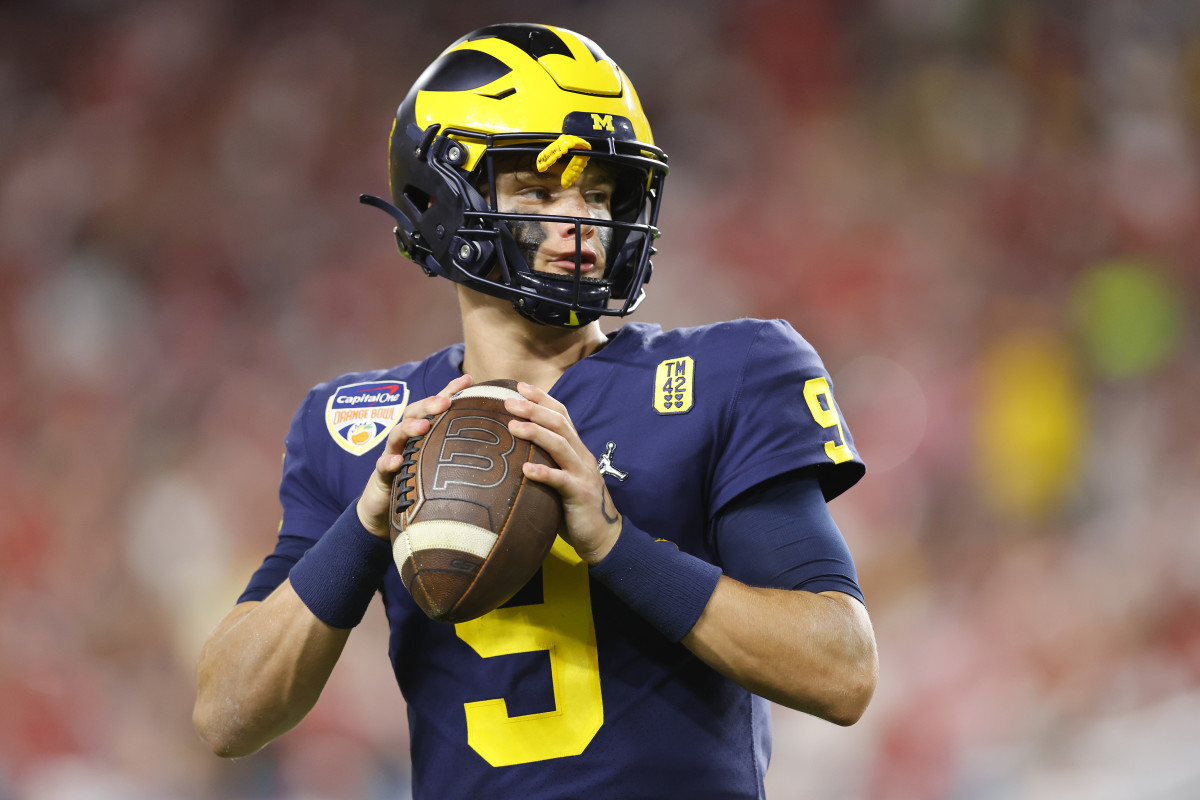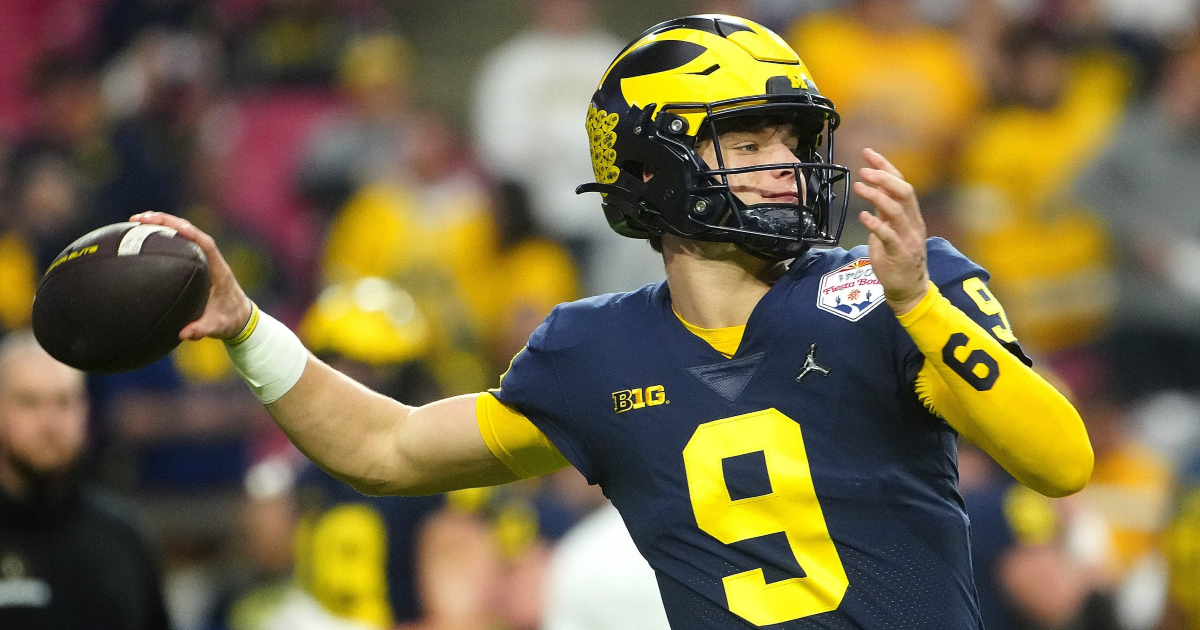JJ McCarthy’s Knee Injury

JJ McCarthy, the starting quarterback for the Michigan Wolverines, suffered a knee injury during the 2023 season, raising concerns about his immediate and long-term health. The injury occurred in a crucial game, impacting both his performance and the team’s overall success. This article explores the details of the injury, its immediate and potential long-term effects on McCarthy’s career.
The Incident and Nature of the Injury
JJ McCarthy sustained a knee injury during the Wolverines’ game against the Penn State Nittany Lions on October 21, 2023. The exact nature of the injury was reported as a non-contact knee injury, which occurred while he was scrambling for yardage in the second quarter of the game. While the initial reports suggested it could be a significant injury, further examinations revealed a less severe diagnosis, a sprained MCL (medial collateral ligament).
Immediate Impact on McCarthy and the Wolverines
The injury forced McCarthy to leave the game against Penn State, and he was unable to return. His absence had an immediate impact on the Wolverines’ offensive performance. The team struggled to maintain their offensive momentum without their starting quarterback, leading to a noticeable decline in their overall efficiency. The Wolverines eventually lost the game to Penn State, highlighting the importance of McCarthy’s presence on the field.
Potential Long-Term Implications
The sprained MCL injury, while not as severe as other potential knee injuries, still carries potential long-term implications for McCarthy’s season and future career.
- The recovery timeline for an MCL sprain can vary depending on the severity of the injury. McCarthy’s recovery time was estimated to be around 2-4 weeks, potentially affecting his availability for several games.
- While the injury was not season-ending, the potential for re-injury exists. This could create uncertainty and potentially limit McCarthy’s performance in the remaining games of the season.
- In the long term, the injury could impact McCarthy’s confidence and ability to play at his full potential. While an MCL sprain is generally not career-threatening, it can sometimes lead to chronic pain or instability in the knee joint, which could impact his performance in the future.
Medical Perspective on the Injury

Knee injuries are common in football, and JJ McCarthy’s injury highlights the potential risks associated with the sport. Understanding the types of knee injuries, their causes, and the recovery process is crucial for both athletes and fans.
Common Types of Knee Injuries in Football
Knee injuries in football can range from minor sprains to severe ligament tears. The most common types include:
- Anterior Cruciate Ligament (ACL) Tear: This injury occurs when the ACL, a strong ligament in the knee, is torn. It often happens when an athlete suddenly changes direction or experiences a direct blow to the knee. ACL tears are often severe and require surgery.
- Posterior Cruciate Ligament (PCL) Tear: The PCL is another ligament in the knee, and a tear can occur when the knee is hyperextended or when there is a direct blow to the front of the knee. PCL tears are less common than ACL tears, but they can be serious.
- Medial Collateral Ligament (MCL) Tear: The MCL is located on the inside of the knee and helps to stabilize the joint. It can be torn when the knee is struck from the outside or when the knee is forced inward. MCL tears are usually less severe than ACL or PCL tears.
- Lateral Collateral Ligament (LCL) Tear: The LCL is located on the outside of the knee and helps to stabilize the joint. It can be torn when the knee is struck from the inside or when the knee is forced outward. LCL tears are less common than MCL tears.
- Meniscus Tear: The meniscus is a C-shaped piece of cartilage that acts as a shock absorber in the knee. It can be torn when the knee is twisted or when there is a direct blow to the knee. Meniscus tears can cause pain, swelling, and difficulty moving the knee.
Recovery Process for a Knee Injury
The recovery process for a knee injury depends on the severity of the injury and the individual’s overall health.
- Initial Treatment: The initial treatment for a knee injury usually involves RICE (Rest, Ice, Compression, Elevation). This helps to reduce swelling and pain.
- Rehabilitation: Rehabilitation is crucial for a successful recovery. It typically involves a series of exercises designed to strengthen the muscles around the knee, improve range of motion, and restore stability. These exercises may include:
- Range of motion exercises: These exercises help to improve the flexibility of the knee joint. Examples include knee flexion and extension exercises.
- Strengthening exercises: These exercises help to build strength in the muscles surrounding the knee. Examples include quadriceps and hamstring exercises.
- Proprioceptive exercises: These exercises help to improve balance and coordination. Examples include standing on one leg or walking on uneven surfaces.
- Surgery: Surgery may be necessary for certain knee injuries, such as ACL tears or severe meniscus tears. The goal of surgery is to repair or reconstruct the damaged tissue.
Potential Complications
There are potential complications associated with knee injuries, including:
- Chronic pain: Some people may experience chronic pain even after their knee injury has healed.
- Osteoarthritis: Knee injuries can increase the risk of developing osteoarthritis, a degenerative joint disease.
- Re-injury: There is a risk of re-injury after a knee injury, especially if the rehabilitation process is not followed carefully.
Risks Associated with Returning to Play Too Soon
Returning to play too soon after a knee injury can increase the risk of re-injury. The athlete’s body may not be fully healed, and the ligaments and muscles may not be strong enough to withstand the demands of the sport.
“It’s crucial for athletes to listen to their bodies and not rush back to play before they are fully recovered. A premature return to play can lead to a more severe injury and a longer recovery time,”
said Dr. Sarah Jones, a sports medicine specialist.
The Impact on Michigan Football: Jj Mccarthy Knee Injury

JJ McCarthy’s knee injury is a significant blow to the Michigan Wolverines, potentially impacting their offensive strategy and overall team performance. The severity of the injury and the length of his absence will determine the extent of the impact.
The Impact on Michigan’s Offensive Strategy, Jj mccarthy knee injury
The Wolverines’ offensive strategy relies heavily on McCarthy’s dual-threat ability. His ability to run and pass effectively opens up the playbook and creates opportunities for other players. With McCarthy out, Michigan will likely need to adjust their offensive approach. They might opt for a more conservative approach, focusing on a strong running game and short passes to minimize risk. This could limit the Wolverines’ offensive explosiveness and put more pressure on the defense to perform at a high level.
Potential for Other Players to Step Up
In McCarthy’s absence, other players will need to step up and fill the void. The most likely candidates are:
- Cade McNamara: A seasoned quarterback with starting experience, McNamara offers a different skillset than McCarthy. He is a more traditional pocket passer, with a strong arm and a good understanding of the offense. However, his mobility is limited compared to McCarthy.
- J.J. Colbert: A highly-touted freshman quarterback, Colbert brings a lot of potential to the table. He has a strong arm and good athleticism, but he lacks experience at the collegiate level.
The success of these players will depend on their ability to adapt to the pressure of leading the offense and their chemistry with the rest of the team.
Implications for Michigan’s Chances in Upcoming Games
McCarthy’s injury could significantly impact Michigan’s chances in upcoming games. The Wolverines have a challenging schedule ahead, with games against tough opponents like Penn State, Michigan State, and Ohio State. Without McCarthy, they will need to rely on their defense and special teams to carry the load. The Wolverines’ defense has been strong in recent years, but they will need to play at an elite level to compensate for the offensive limitations.
Man, that JJ McCarthy knee injury is a bummer. He’s a key player for the Vikings, and they’re already dealing with a lot this season. Speaking of the Vikings, they’ve got a rich history and a loyal fan base.
Let’s hope McCarthy can bounce back quickly, the Vikings need him!
JJ McCarthy’s knee injury got everyone worried, but it’s not the only one that’s got fans on edge. Remember Jahmyr Gibbs? His injury is a big deal for the team, and it’s a reminder that these guys are human, even if they’re playing like superheroes on the field.
Hopefully, JJ can bounce back quickly and get back to throwing those touchdown passes.
